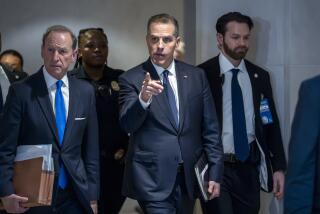Battle Over Capital Perks Grows Angrier : Scandals: White House declines to testify on expenses. An audit finds more irregularities in the House post office.
- Share via
WASHINGTON — The politically tinged dispute between President Bush and Congress over mismanagement and abuse of privileges grew angrier Tuesday as the White House ignored a House subcommittee’s request for testimony on presidential expenses.
House Democrats complained that the executive branch is refusing to cooperate with a legitimate inquiry.
Indeed, the question of what constitutes appropriate perquisites of office and what amounts to abuse was all but submerged in partisan maneuvering. With 11 television cameras shooting videotape of five empty chairs that had been set out for White House witnesses who did not appear, Rep. Paul E. Kanjorski (D-Pa.) declared:
“Let’s not make this a circus. I can’t imagine this information should be kept away from us. We’re stymied at this point.”
In another development, House Speaker Thomas S. Foley (D-Wash.) swore in a new acting House postmaster, Michael J. Shinay. He had been executive assistant to the director of the U.S. Postal Service. Shinay replaces Richard Rota, who quit under pressure in the wake of allegations about mismanagement there.
House Democratic leaders also proposed changes in how the House conducts its nonlegislative business. Their proposal, presented to a bipartisan task force, would create a director of nonlegislative and financial services and turn the House post office over to the U.S. Postal Service, abolishing the job of House postmaster. It also would end political patronage in some jobs.
The plan is expected to be discussed at a Republican conference today. It adopts major elements of Republican proposals. The director of nonlegislative and financial services would operate as both an administrator and chief financial officer. The position would be filled “jointly” by the Speaker, majority leader and minority leader.
It was disclosed that a General Accounting Office audit of the House post office found an unlocked vault stacked with $100 money orders, personal and public money mixed together and employees ill-equipped to handle stamps and cash.
Rep. Vic Fazio (D-West Sacramento), a member of the bipartisan task force on House reforms, confirmed the findings of the audit. He said the results “suggest that we still have some work to do” in getting “these employees up to speed.”
The hearing on White House perks, staged by the House Post Office and Civil Service subcommittee on human resources, turned into a partisan quarrel. Kanjorski, the subcommittee chairman, described the failure of the invited White House officials to appear as “very disappointing.” The ranking Republican member, Rep. Dan Burton of Indiana, complained, “This is great theatrics.”
He called the hearing a “political hunting expedition” rather than a serious inquiry into executive-branch spending, designed to divert attention from the House bank and post office scandals.
“I do not have the intention of making this a political spectacle,” Kanjorski said.
Foley told reporters that it is “strange” that the White House would refuse to provide the information necessary to examine executive privileges.
“I regret the lack of cooperation by White House officials,” he said. “I can’t see any reason the White House would want to give for not cooperating.”
At the White House, Deputy Press Secretary Judy Smith said that Kanjorkski is on a “fishing expedition” and that a deputy assistant to the President for management had testified a week ago before another congressional subcommittee on White House budget matters.
“This is not a stonewall,” she said. “The White House is not embarrassed about any of these issues.”
She refused to provide annual costs of presidential travel, which Kanjorski’s subcommittee estimated will be $59 million in the current fiscal year.
While the White House maintains that the President’s reelection committee reimburses the federal government for the cost of his political travel, the amount paid is a small fraction of the actual cost.
Under the formula used by the committee, the government is paid the equivalent of a first class fare for the route flown by Air Force One.
Thus, for a presidential trip to Los Angeles for a political event, for example, the reimbursed round-trip cost would be approximately $2,200. However, according to figures provided by the White House, the cost of flying Air Force One, a similar back-up aircraft, and a cargo plane carrying communications equipment and vehicles would be $450,000 to $500,000.
Times staff writer Michael Ross contributed to this story.
More to Read
Get the L.A. Times Politics newsletter
Deeply reported insights into legislation, politics and policy from Sacramento, Washington and beyond. In your inbox twice per week.
You may occasionally receive promotional content from the Los Angeles Times.










